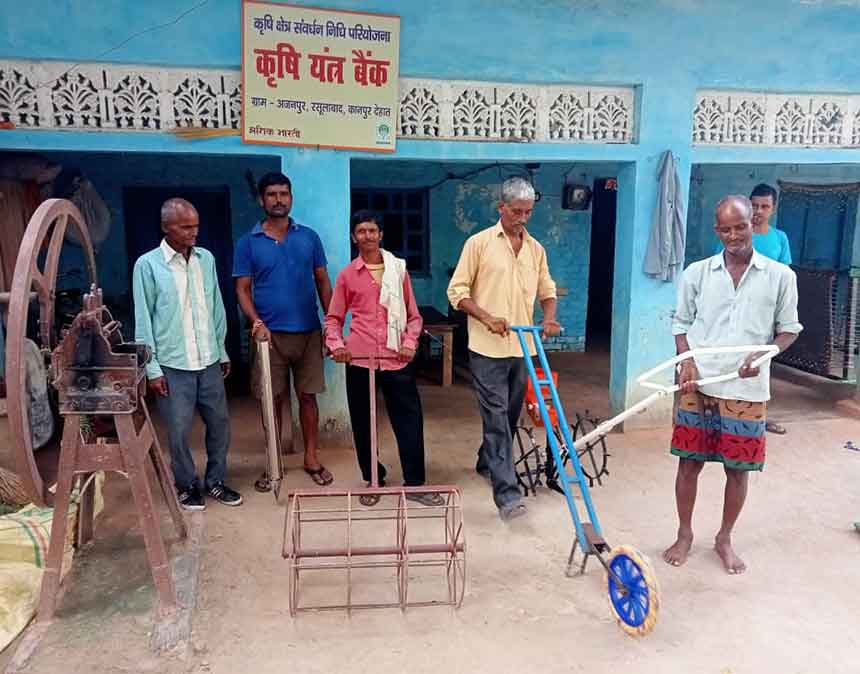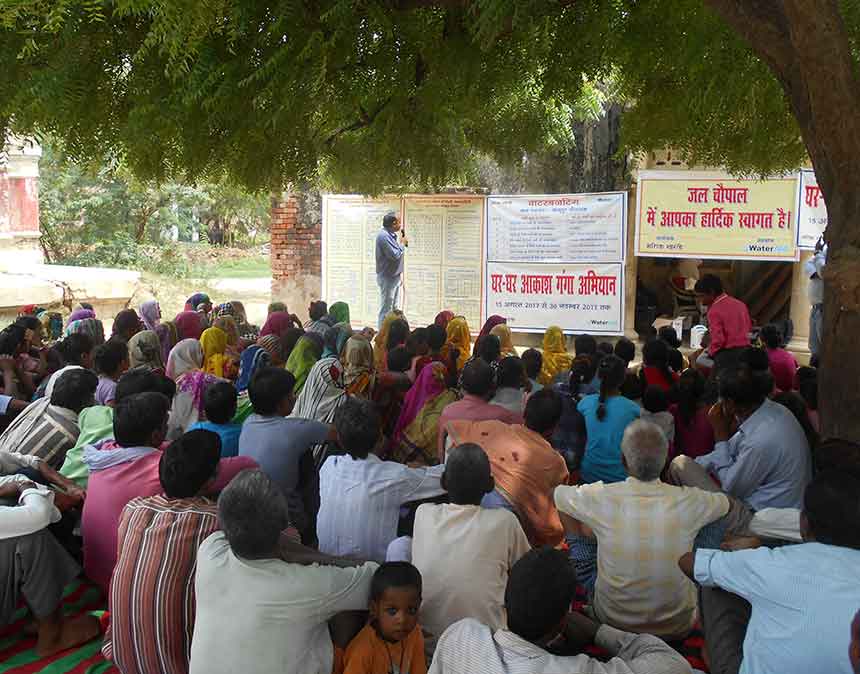Strengthening Natural Resource Based Livelihoods
The livelihood development initiatives at Shramik Bharti encompasses the interconnectedness of social and ecological systems. We believe that Natural Resource based Livelihoodsengird potential to maintain ecological balance while earning decently and sustainably
Agriculture and Livelihood
Our Annadata is doomed! In the race of getting more and more production, market is selling variety of seeds, poisonous chemicals on the name of fertilizers, pesticides, nutrients and what not? This is badly affecting our soil health and the food produced neither tastes good nor provides nutrition. While faming is such an occupation that can provide ecological sustainability, prosperity of farming family, nutritious food and food security, together.
Food should give life to consumers and sustainable living to farmers. With this understanding, Shramik Bharti is promoting Natural Farming in Uttar Pradesh & Punjab.
Natural Farming
Since 2015 Shramik Bharti is mobilizing and educating small and marginal farming families to shift them from chemical farming to natural farming.
Our Natural Farming initiative began with skilling Women members of rural Self Help Groups, in natural farming practices, with the feel that women are more concerned towards the nutritional needs of the family. So, the adoption of technology will be fast. However the overall idea was to bring women on the forefront of post farming economic activities and decision making. So that their role as women farmers get recognized which has been long due.
Natural farming has been able to improve natural resource use efficiency and economic opportunities for rural households engaged in agriculture and allied sector through a bouquet of activities.

Today around 1500 farmers in Uttar Pradesh and Punjab have been practicing natural farming following the law of Avartansheelta (आवर्तनशीलताके नियम पर आधारित प्राकृतिक खेती)that propagates the ideology of own concept, own manure, own water, own seed and own energy (fuel) to makefarmer self- reliant andsovereign.We have witnessed restoration of 1000+ acre land which is also helping in carbon sequestration.
Kitchen Garden
During COVID 19 pandemic, Kitchen Gardens and Multilayer Kitchen Gardens, developed using natural farming practices, set the seal on its pre- established role in ensuring food and nutritional security of marginalized rural communities and a means of livelihood.
Kitchen Gardens increase farmers’ nutritional intake by adding diversity into their meals in a cost-effective manner. They also contribute to the farmer’s household income, either via the selling of food grown in the gardens or by the consumption of food that would otherwise be purchased from markets with a major amount of the family’s income.
More than 3500 farmers are experimenting with Natural Farming by developing Kitchen Gardens/Multilayer Kitchen Gardens, in Uttar Pradesh & Punjab.
Model Farm
Farmers in Uttar Pradesh and Punjab have been trained in developing various models of Model Farms based on the land size and individual needs.


Community Seed Banks
Shramik Bharti is promoting natural farming that is based on use of traditional seeds and local resource based agriculture. By formation and strengthening of Community Seed Banks we have been able to enhance farmers’ resilience by ensuring availability of traditional seeds of locally adopted crops.
Agri Tool Bank
Agri tools like Synthe, Potato Weeder, Rice Weeder, Seed Drill, Seed marker etc. have beenmade available at Community Level Agri Tool Banks for collective use by natural farmers.
Farmers in Uttar Pradesh and Punjab have been trained in developing various models of Model Farms based on the land size and individual needs.


Sodic Land Reclamation Program
When there is accumulation of salts in the upper layer of soil, it impacts the fertility of soil and the ecosystem that thrives in it.Viewed in the context of Uttar Pradesh where the farmers possess smaller land holdings, this accumulation of salt brings in the vicious cycle of poverty, unemployment, and starvation.
Shramik Bharti has reclaimed 18,328 hectares of sodic land benefiting 47,828 small & marginal farmers. The reclaimed lands are giving additional crop production of 183,280 MT having a market value of about Rs. 275 crore per year.
Allied Agriculture Livelihoods
Backyard Poultry
Women SHG members who do not have agricultural land or have negligible land holding are encouraged to keep country birds in their backyard and sell the surplus eggs and meat. This adds nutrition to the family diet and provides regular additional income. A short training of 2-3 days is organized to train women to manage this activity.
500+ landless and small and marginal farming households have been trained and engaged in Backyard Poultry Activities in Uttar Pradesh & Punjab to ensure their nutritional security and a means of additional income.


Goat Rearing
Recognizing the potential of Goat Rearing as simple yet profitable and sustainable livelihood Shramik Bharti has trained and supported more than 350 rural marginalized households (by engaging women and youth) in Uttar Pradesh.
We provide trainings to women to take up goat rearing to entrepreneurship level and supporting them to emerge as Goat Entrepreneur.
Water Security
Shramik Bharti has been promoting equitable and efficient water management under its Water Security Program. The core components of our water security initiative include capacitating community & local government (Panchayat) in development of Water Security Plans through Jal Chaupals, mainstreaming water security issues in GPDP( Gram Panchayat Development Plan) and creation of water conservation model structures Viz. Rain water Harvesting Structures, Recharge Wells, Pond Rejuvenation and cleaning.
In Punjab, 8 Village Ponds cleaned and developed as village wastewater treatment plantsbenefitting more than 6000 population. Add to this, 50 rain water harvesting pits in farmlands and 5 demo roof top rain water harvesting structures constructed.
In Uttar Pradesh, by empowering Gram Panchayats(local government) and strengthening their capacities in addressing water security issues of their communitie, rejuvenation of 4 ponds, construction of Demo Rooftop Rainwater harvesting structures and Recharge well in villages of Kanpur Nagar was achieved.
Farmers in Uttar Pradesh and Punjab have been trained in developing various models of Model Farms based on the land size and individual needs.

To reduce waste water going directly in to river Ganga, 2 community waste water filter chambers were constructed in riverside villages in Kanpur Nagar district of Uttar Pradesh.
Household Waste Water Soak pits
In Uttar Pradesh 1693 Household waste water soak pits got constructed in 21 villages for effective management of grey water. These soak pits contributed in groundwater recharge by 1,48,306 cubic meter per year. While in Punjab 445 Household wastewater soak pits got constructed capable of recharging approx. @400 liters of water per day or 1.5 lakh liters annually.
Hand Pump Soak Pits
In Uttar Pradesh, 244 Hand pump Soak pits have been constructed.


Jal Chaupals
Shramik Bharti has been engaged in organizing Jal Chaupals, focusing on the issues of water budgeting, water harvesting and water management in Uttar Pradesh.

